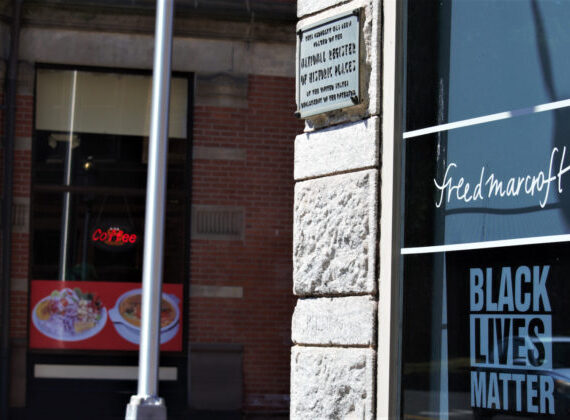
After years of stagnation, Hartford has been making progress in fits and starts. Yet, there is unfulfilled potential that makes one ask: what holds us back?
It’s not money. Need sparks creativity. Cities can find funding.
It’s not laws. Those can be changed.
Signs point to an abundance of caution, wielded selectively, and married to a missing imagination.

This was witnessed at meetings — in March 2017 and 2018 — discussing the plan to revamp the Bartholomew Avenue streetscape. Using $3.6 million funded by the State of CT TOD and Responsible Growth Incentive Fund, MDC, and City of Hartford, this project has been met with grumbles from those clinging to worn out ideas and habits. In sessions where the purpose was to dream for a few minutes, few participants — residents and those from the business community — dared to indulge.
To be clear, this is not advocacy for never asking questions about projects. But there is a distinction between generating ideas and revising them. Applying the latter process too early means stunting possibilities.

Could it be that the average person does not understand the concept of transit-oriented development (TOD)? In short, it means capitalizing on nearby transit with the purpose of building up the community. Housing and jobs are those things people are always asking for more of, right?

Even with report-after-report showing that Millennials and middle-aged adults are driving less, even with the proximity to the Parkville CTfastrak station and Park Street bus line, business owners in the neighborhood fretted over the potential loss of a few on-street parking spaces. At 5:30 pm, a conservative count revealed 25 open parking spaces — more if drivers could handle parallel parking, on the block of Bartholomew between Park and Hamilton. This information was readily dismissed by someone wasting no time to explain that the State of Connecticut workers (Bartholomew and Hamilton) leave at 4:30 pm. The popular Hog River Brewing Co., had been open since three that afternoon, just saying.
The tragicomic death grip on parking, particularly in this location, may boost someone’s personal feeling of security, but this inertia is not beneficial in the larger sense.
Streets that de-prioritize car usage see stronger economic growth. It makes sense. If a space is more pleasant for walking, biking, and just hanging out, then why wouldn’t someone choose to be there over the alternative? If the goal is to improve the local economy, then it is illogical to attempt to thwart changes that would help us get there.
This project proposes a number of positive changes including a walkway from Bartholomew Avenue to Pope Park West, an underappreciated park that currently is cut-off from use because of the total absence of sidewalks along Pope Park Highway. It looks like chicanes, bump-outs, and bioswales would be added to Bartholomew Avenue to help with traffic-calming and environmental remediation. There is the possibility of a pocket park with some artistic feature that would serve as a visual welcome to the street; this could be a great opportunity to employ local talent, such as how Hartford Paint the City is installing murals by various artists.
 With Bartholomew Avenue in sight of and around the corner from the Parkville CTfastrak station, this plan is not as progressive as it could be, no doubt scaled down because of the feedback. Still, it offers opportunity to move Hartford toward more contemporary standards.
With Bartholomew Avenue in sight of and around the corner from the Parkville CTfastrak station, this plan is not as progressive as it could be, no doubt scaled down because of the feedback. Still, it offers opportunity to move Hartford toward more contemporary standards.
Sometimes concessions make sense. Removing fewer parking spots than what would be groundbreaking could become acceptable if Hartford Parking Authority began charging for motorists to rent those on-street spaces. To encourage short term parking — for which on-street parking is actually intended — a steeper rate could be charged to those staying beyond the standard two-hour limit. This would motivate employees to use lots or find other ways to get to work (bus, bike, walk, carpool, rideshare, skateboard); this in turn frees up spaces for those wanting to patronize businesses on Bartholomew. The parking revenue could be used to pay for maintenance of the new street features on Bartholomew Avenue, such as those bioswales.
Tradition and routine should not be used to dictate plans and policy. That includes our habitual aversion to risk when those risks are viewed as challenging current norms.

Carl Guerriere
I was a primary author of Parkville’s original and Hartford’s first NRZ neighborhood plan where we stressed a holistic approach to community development. Hartford continues to approach challenges in silos, streetscapes, public safety, etc. A redesign of Bartholomew Ave. needs to be viewed in a much larger context which could allay fears of those who have experienced a life dominated by the automobile.
Bob Painter
Bob Painter: Amen! We in Hartford ordinarily either go hogwild for any new idea or go hog-negative. Very seldom do we look at a new idea and say ‘oh I think this is pretty good but it would be improved if we did this or that’. Or we say ’his is a terrible idea but if we did such and such it might work out pretty well’. Such an approach could help us come together in the middle and result in a creative project. One Bartholomew Avenue possibility could be a factory at the end of the street perhaps putting together railroad cars but it could be anything.